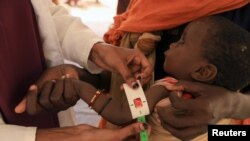The WHO marks April 7 as World Health Day, also celebrating the anniversary of the organization's founding in 1948. This year the organization's theme is "Health For All."
WHO Director-General Dr. Tedros Adhanom Ghebreyesus released a statement marking the day by calling on nations to "come together for a common purpose."
He said the world had much to be proud of, but added much still needs to be done to attain the highest health standard for all people, especially considering the world’s global health challenges.
"We continue to face vast inequities in access to health services, major gaps in the world’s defenses against health emergencies, and threats from health harming products and the climate crisis," said Tedros.
WHO said the eradication of smallpox, reduction of the incidence of polio by 99%, immunization of millions of children, declines in maternal mortality and improving health and well-being for millions, are examples of global health progress over the past 75 years.
But to meet continued global health challenges, WHO says it is calling on nations to invest and prioritize education, skills and jobs in health to avert a projected shortage of 10 million health workers by 2023.
WHO also urged countries to provide health by prioritizing primary health care as a foundation of universal health coverage.
Dr. Ahmed Ogwell Ouma, acting director of the Africa Centers for Disease Control and Prevention, told VOA the organization is continuously working to ensure Africa’s populous is protected from disease threats and health emergencies.
Ouma said the need to improve the capacity to deliver "health for all" is a top priority for Africa CDC.
"We have shortages of health workers, we have shortages of health facilities, we have shortages of health products," Ouma said.
"And as Africa CDC, one very core part of our work is to strengthen our health institutions, to strengthen our health workers capacity and also to ensure that health products are being manufactured on the continent, and therefore more easily available," he added.
According to the WHO, millions of people globally do not receive the medical treatment and prevention tools they need. Many of them are in low and middle-income countries, including in the African region.
The WHO says looking forward to the next 75 years, "a renewed commitment to health equity will be the key to addressing future health challenges," shifting to promoting health, well-being and disease prevention by addressing root causes and creating the conditions for health to thrive.
VOA's Linord Moudou contributed to this report.
